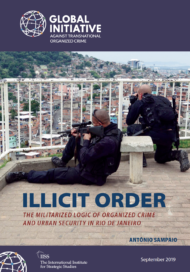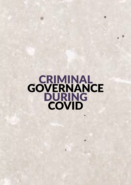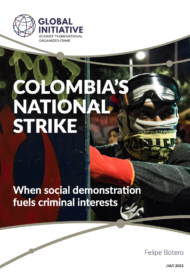Posted on 11 Dec 2014
In the north-west Mexican state of Sinaloa, thousands of families have been forced to abandon their homes, land and belongings by organized criminal groups.
These people, forcibly uprooted by violence, fled their homes escaping from the havoc caused by the war on drugs. Their once quiet lifestyles are now only a memory, and many of them carry on their shoulders the fears and horrors they went through before they moved. They now live in cardboard houses, often with no drainage or drinkable water, or packed together in borrowed rooms, jobless and penniless. They sought peace but found only poverty.
Oscar Loza, activist and member of the Comisión de Defensa de los Derechos Humanos en Sinaloa (Commission on Human Rights in Sinaloa, or CDDHS for its initials in Spanish) has been documenting the stories of these victims. “Some of them left all they had, their few cows and hens, only to end up seeking for a job in the local landfill in Culiacan”[1] he told the Global Initiative in an interview in July 2014, explaining the dreadful situation these displaced people are facing. Loza knows of around 160 displaced that ended up working on landfills, living in misery. Those who had farmed on their land for generations are now working on rubbish dumps. “Only imagine how poor their conditions must have been to resort to a job that pays roughly US$7-8 a day”.
For some, however, no matter how squalid the conditions, it is enough to be alive. Amid the slums, stories are told of entire families were slaughtered with impunity when they attempted to return for their belongings.
The Government of Sinaloa officially reports the existence of 1,380 displaced families. However, the head of the Ministry of Social and Human Development, Juan Ernesto Millán, acknowledges that the official figures are falling short and takes as reference those by the CDDHS, which estimates that there are over 27,000 persons in Sinaloa that have unwillingly fled their hometowns largely on account of drug-related violence. [2]
Sinaloa is not the only Mexican state dealing with this issue. The war on drugs waged by the previous president, Felipe Calderón, resulted in 70,000 deaths in 2006, emptying entire communities in Nuevo León, Guerrero, Veracruz, Michoacán, Tamaulipas and Chihuahua(3). Stories of innocent victims that were caught in the crossfire between the army and drug dealers are regularly heard. Words such as extortion, kidnapping and torture have become part of the everyday lexicon for Mexican families in these provinces. It is said that some families were given the option either to work for these drug dealers, or just to leave and let them do their job. Those who resisted were punished with the vicious methods that are characteristic of Mexican cartels. Those who naively defied their threats were simply killed.
Nevertheless, the Mexican central government has yet to admit to the existence of this issue in official reports, and has done little to address the problem. The information on displacement is transmitted through anecdotes featured in local newspapers and by some media like CNN and Animal Político that, jointly with Insight Crime, have broadcasted the dreadful stories of those who have been uprooted by criminal groups. To date, there is no official record of the scale of this problem in Mexico.
In international law, those displaced by gang violence within Mexico, would fall under the definition of “Internally displaced persons” (IDPs), the same as those displaced by conflict. According to the UNHCR definition, “Unlike refugees, IDPs have not crossed an international border to find sanctuary but have remained inside their home countries. Even if they have fled for similar reasons as refugees (armed conflict, generalized violence, human rights violations), IDPs legally remain under the protection of their own government – even though that government might be the cause of their flight.”
The number of IDPs in Mexico is estimated to be somewhere between 160,000 and 1.6 million. A 2012 report by Parametría, a Mexican research company, claims the number of displaced people in Mexico is 1.6 million, while a more recent report by the Norwegian Refugee Council reports in its latest publication, the 2014 “Global Overview: people internally displaced by conflict and violence”, estimates that the number is only 160,000.[3] It is estimated that in the city of Juarez (Chihuahua) 200,000 people have left due to the large scale of violence. The Norwegian Internal Displacement Monitoring Centre estimates that 20 percent of the population in Chihuahua has displaced, and that at least eleven communities in the province of Tamaulipas are gradually emptying. The report concludes by emphasising that the vast majority have been displaced by the violence of organized criminal groups.
UNHCR, the UN body with the official mandate for refugees and IDPs, on the other hand, appears not to recognize either of these figures and, according to the information and statistics shown on its website, there are no internally displaced people or refugees in Mexico. There is similarly no mention either about the subject in the UNHCR Global Trends 2014 report published on June 20th, 2014. [4] By contrast, the United Nation Office for the Coordination of Humanitarian Affairs (OCHA)[5] and the OAS Inter-American Commission on Human Rights (8) highlight that the magnitude of displacement in Mexico is alarming and requires immediate attention.
__________
[1] Culiacán is Sinaloa’s capital and one of the cities that receive most of the migrants from the most dangerous towns and villages of the province.
[2] The figure shows a significant decrease compared to that of 2011, when the same organization reported that 230,000 have left their homelands since the beginning of the war on drugs in 2006.
[3] NRC (2011), “Desplazamiento debido a violencia criminal y comunal”, [online]
[4] UNHCR (2014), Reporte de tendencias globales.
[5] In 2011, the former Assistant Secretary-General for Humanitarian Affairs mentioned the displacement crisis Mexico was going through on the national media. As reported by La Jornada: “The officer highlighted that OCHA is monitoring the situation of the displaced in Mexico as a result of criminal activities by organized groups, and said that the impact on the victims is truly worrying”.



